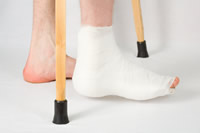Personal Injury and Accidents
Personal Injury Claims

In Massachusetts, you must prove that you have been injured by another party’s careless or reckless actions to win a personal injury claim. Personal injury victims (plaintiffs) can file one of several types of personal injury suits (torts) against the responsible parties (defendants). Some of the key principles of personal injury law are as follows:
Negligence is the failure to use reasonable care. Negligence is present when an individual’s careless act or failure to act has caused injury. While the act may be unintentional, the defendant may still be liable for damages. There is often liability insurance for acts of negligence, provided by the auto insurance, the homeowner's insurance, or another general liability insurance policy.
Strict liability generally applies to product liability, which are claims filed against manufacturers and suppliers for dangerous products that cause injury, and to dog bite claims against dog owners. Liability insurance is often available to compensate victims who suffer personal injury as a result of the strict liability of the responsible party.
Intentional or reckless misconduct is the malicious or intentional infliction of harm that results in an injury or death. If the misconduct results in death, the family of the victim may recover punitive damages under some circumstances.
Comparative negligence may arise when the actions of the injured person have contributed to his or her own harm. If the plaintiff is comparatively negligent, that will reduce the amount of the award. The negligence is divided between the injured party and the defendant and the damages are reduced accordingly.
Damages are awarded to victims who have suffered personal injuries or wrongful death as a result of the misconduct of another individual or business. In Massachusetts, damages are awarded for special damages, including medical bills and lost earnings, for scarring and disability, for loss of enjoyment of life, for loss of consortium, and for pain and suffering. Punitive damages may be awarded in some wrongful death cases.
Personal injury and wrongful death cases are technical and can be complex. Personal injury and wrongful death cases are always emotional. While you are upset or grieving, you should not make any major decisions that will limit any future recoveries without consulting an attorney. You should not enter into any settlement, sign any release or accept any money in exchange for releasing an individual, corporation, or insurance company from liability without first knowing what insurance coverage or other redress is available to you and your family.
Xifaras Law can help you decide your best course of action and can develop the best legal strategy for demonstrating your claim.
Brief Introduction to Massachusetts Insurance Law

What's Covered?
Medical Bills: In general, the first $2,000.00 in medical bills is paid by the Personal Injury Protection (PIP) insurance carrier of the car you were in or hit by if you were a pedestrian or a bicyclist. If you have private health care insurance, Massachusetts Law requires that medical bills in excess of $2,000.00 be submitted through your provider for payment. If you do not have private health care insurance, or if your health care insurance company refuses to pay your medical bills, you may be entitled to up to $8,000.00 in PIP medical coverage.
Lost Wages: If you lose money because of your inability to work due to your injuries, you may be entitled to collect 75% of your lost wages, based on your average weekly wage, from the PIP carrier, up to $8,000.00.
Bodily Injuries and Wrongful Death: If you have more than $2,000 in medical bills, a fracture, or other serious injury, you may be entitled to compensation for injuries, including scarring, pain and suffering, permanent or partial disability, and loss of ability to enjoy life. Wrongful death claims are also compensable under Massachusetts motor vehicle laws.
Insufficient Insurance: If the person who caused your injuries does not have insurance, or inadequate insurance to cover your damages, you may be entitled to collect uninsured or underinsured coverage from your own automobile policy or a family member's automobile policy.
What to Do When You Have a Car Accident
If you have been involved in an automobile accident, or injured as a pedestrian:
- Obtain as much information as possible about the vehicles involved, as well as names, addresses and telephone numbers for drivers.
- Request the names, addresses and telephone numbers of any witnesses.
- Make sure police are aware of any traffic violations that the operator may have committed.
- If you are injured, get medical attention as soon as possible.
- Promptly notify your insurance company about the accident.
- Obtain photographs of vehicles, injuries and accident location.
Contact a lawyer promptly to determine your legal rights.
